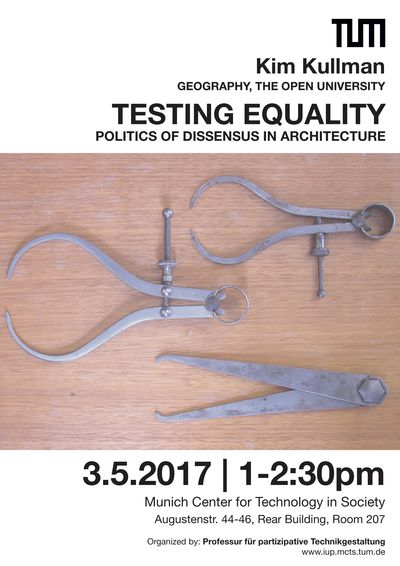3.5.2017 - DR. KIM KULLMAN "TESTING EQUALITY: POLITICS OF DISSENSUS IN ARCHITECTURE"

On May 3rd 2017, 1-2:30pm we have the pleasure to have Dr. Kim Kullman (The Open University) giving a talk at the MCTS's Room 270 (Augustenstr. 44-46, Rear Building).
TESTING EQUALITY: POLITICS OF DISSENSUS IN ARCHITECTURE
This lecture evokes the writings of Jacques Rancière to propose a politics of architecture that is attentive to the polemical conditions under which more equal ways of composing built environments emerge. Comparing and contrasting a series of ongoing and completed building projects that proclaim their sensitivity to disabled users, the lecture argues for a politics of architecture that does not involve conflicts over power or identity, but revolves instead around a perennial testing of materials that seeks to alter the bodily circumstances that built form offers for collective engagement and inhabitation. Such testing suggests that accommodating difference and diversity in architecture requires an uncertain experimental process, where a building undergoes constant destabilisation by new claimants, who can both verify and expand its equality. Bringing together Rancière and architecture also provides an occasion to demonstrate how his thinking overcommits to the eventfulness of politics and omits to explore how its effects might be sustained over time. The lecture therefore counterpoises the disruptive politics of Rancière to institutional practices and argues that fostering responsive architecture entails seeing the two as mutually constitutive.
Dr. Kim Kullman is a Lecturer in Geography at The Open University. He obtained a PhD from the University of Helsinki, Finland, and worked as an Undergraduate Tutor at the University of Warwick and as a Research Associate at Goldsmiths College, University of London as part of the 'Universalising Design' project. His current research on 'design geographies' engages with architecture and design to investigate the knowledges and methods deployed by practitioners to shape urban environments that are responsive to the diverse bodies that inhabit and pass through them. He is specifically interested in the ethics and politics of built form.